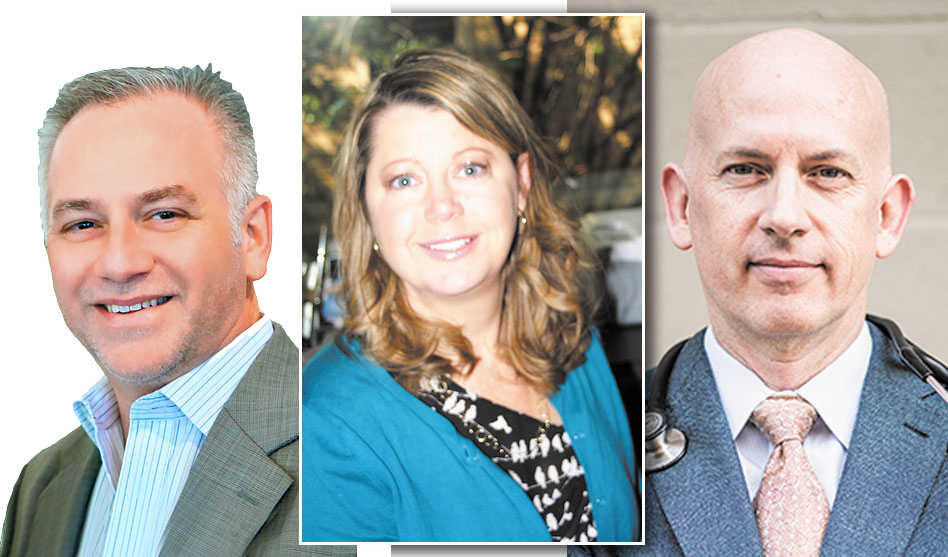 Left to right, DeeJay Johannessen, Melissa Grove and Dr. Gene Voskuhl
Left to right, DeeJay Johannessen, Melissa Grove and Dr. Gene Voskuhl
Doctors, therapists are finding new and innovative uses for the platform
DAVID TAFFET | Senior Staff Writer
taffet@dallasvoice.com
One way in which the federal government did respond quickly and successfully to the COVID-19 crisis was changing the reimbursements for Telehealth. Now medical doctors and therapists receive the same reimbursement from Medicare and Medicaid for an online visit as they do for in-person visits.
Most insurance companies have also increased their payments.
HELP’s TelePrEP
Telehealth has rapidly become the new standard of care during the pandemic and has been adopted by agencies throughout the community to replace or supplement in-person visits. The HELP Center for LGBT Health and Wellness in Arlington and Fort Worth offers PrEP at no cost through Telehealth. Executive Director DeeJay Johannessen explained a new patient can go online, request an appointment and receive paperwork electronically. They call their program TelePrEP.
“In a video conference, they do everything they would do in a visit,” Johannessen said.
Then HELP Center sends the patient a kit to do self-swabs to check for STDs.
HELP Center’s Clinical Nurse Specialist Kelly Tillman said once the patient has the swabs, they take them to Quest Labs where lab employees take blood samples to check for hepatitis and do an HIV test.
“If they’re positive, we notify them, and they come to the clinic for treatment,” Tillman said. Some STDs, such as chlamydia, are treated with pills that can be sent from the pharmacy.
Once the infection is cleared up, patients must agree to a Telehealth visit every three months.
What TelePrEP has enabled HELP Center to do is reach out to anyone anywhere in Texas. Currently, PrEP clients come from everywhere from Tyler in East Texas to Lubbock in West Texas. Tillman said if there isn’t a Quest Lab in the vicinity, they’ll arrange for a local lab to take the tests.
While Truvada has been the traditional medication used in PrEP, Tillman said, “We prescribe Deskovy because patients seem to have fewer side effects than with Truvada.”
The advantage of TelePrEP, Tillman said, is increased access to care and decreased need to travel. And all services are free.
Legacy Counseling
Melissa Grove is executive director of Legacy Counseling Center. She said telehealth counseling is now covered by insurance at the same rate as an in-person visit. For someone who doesn’t have access to a computer or can’t download the software to a smart phone, a telephone session is also covered.
“Telephone [sessions were] never reimbursed at all” before, Grove said.
She said her therapists were concerned with the loss of one-on-one, face-to-face sessions, but when that became impossible during the pandemic, they gave Telehealth a shot. “Still,” she added, “some people we feel need to be seen in person.”
Telehealth has increased access to care, Grove said, noting that some Legacy clients had to take three buses, traveling an hour-and-half or more to get to their counseling sessions. With online sessions, patients are more reliably getting to their appointments, Grove said.
But what do patients think about it? Grove said the feedback’s been overwhelmingly positive.
Telehealth also reduces the triple stigma — being gay, being HIV-positive and seeking treatment for substance abuse — that Grove said some her patients face when going to an appointment in the office.
While agencies like hers often talk about patients who are “lost to care,” Grove said the problem really lies in difficulties in accessing that care. “Lost to care?” she said. “We make services a pain to get.”
Now Telehealth allows Legacy to serve clients in rural areas, too. And tech-savvy younger patients who might find in-person visits intimidating feel perfectly natural in an online environment.
And, Grove assured, the platform is HIPAA-compliant, secure and maintains patient-client confidentiality.
Grove said she’s also looking into getting mobile hotspots for clients without access to the internet. And she’s seeking used laptops in good working order so some clients can connect on a full-size screen rather than a small phone screen.
Resource Center LGBTQ Health
Dr. Gene Voskuhl runs the Resource Center’s LGBTQ Health. Since the pandemic began, he’s continued seeing his patients via Telehealth, and, he said, the reaction has been surprisingly good.
The Telehealth platform he uses automatically connects him to the patient’s electronic medical records, so a lot of what he does is ask questions and counsel his patients online. Sometimes he determines a pain or malady needs an in-person examination, but office visits have been cut by 90 percent.
When someone does need to come into the office, it’s one patient at a time. There’s no waiting room.
“We still do most blood draws,” Voskuhl said. But if it’s more convenient, those can be arranged to be taken directly at the lab.
While it isn’t a traditional medical exam — Stick out your tongue and say “ahhhhh” just don’t work online — some things work surprisingly well. One online patient had a rash but contacted Voskuhl from work. So he went into the bathroom with his cell phone, showed the rash and the doctor knew exactly what to do. Voskhul sent a prescription and the problem was taken care of.
Without Telehealth, treating that simple rash would have taken an extra hour or two considering travel time and wait time in the office.
Another thing Voskuhl said he likes about Telehealth is getting to know his patient better. The computer takes him into his patients’ homes where he sometimes meets the pets and partners.
“I get a little bit deeper feel for the household,” he said. And that translates into better care.
